

Pierre Merle : Que sait-on des pratiques d'évaluation scolaires ? Noter ou ne pas noter à l’école ? Et si nous nous trompions de question ? La note à l’école fait régulièrement débat sous nos latitudes.
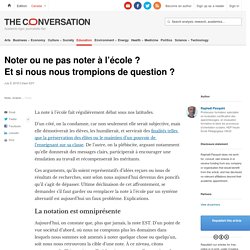
D’un côté, on la condamne, car non seulement elle serait subjective, mais elle démotiverait les élèves, les humilierait, et servirait des finalités telles que la préservation des élites ou le maintien d’un pouvoir de l’enseignant sur sa classe. Concevoir des évaluations... qui évaluent vraiment. La vogue des QCM (questionnaires à choix multiples) est moins grande en Europe qu'en Amérique du Nord, mais ce modèle d'exercice a partout trouvé un regain de popularité avec les outils de formation à distance.
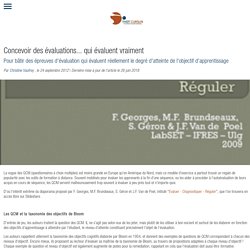
Souvent mobilisés pour évaluer les apprenants à la fin d'une séquence, ou les aider à procéder à l'autoévaluation de leurs acquis en cours de séquence, les QCM servent malheureusement trop souvent à évaluer à peu près tout et n'importe quoi. D'où l'intérêt extrême du diaporama proposé par F. Georges, M.F. Brundseaux, S. Comment et pourquoi donner des rétroactions aux élèves?
Dans la vague des travaux de Coe, une stratégie d’enseignement apparait en tête de liste : donner des rétroactions aux élèves.
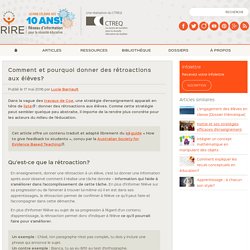
Comme cette stratégie peut sembler quelque peu abstraite, il importe de la rendre plus concrète pour les acteurs du milieu de l’éducation. Cet article offre un contenu traduit et adapté librement du guide « How to give feedback to students », conçu par la Australian Society for Evidence Based Teaching. Qu’est-ce que la rétroaction? En enseignement, donner une rétroaction à un élève, c’est lui donner une information après avoir observé comment il réalise une tâche donnée – information qui l’aide à s’améliorer dans l’accomplissement de cette tâche. What is authentic assessment? A Z of Assessment Methods FINAL table. Why is assessment important? - Engage in Assessment. Interview with Professor David Boud. Assessment Matters.
Evaluation: assessing student achievement of learning outcomes - Macquarie University. The psychology of winning - and losing. (CBS News) The phrase "Win some, lose some" will be little consolation for the players and fans of whichever team loses in today's Super Bowl. Just ask somebody who's been there.
Our Cover Story is reported by Susan Spencer of 48 Hours: In football-crazed Buffalo, the Bills are revered . . . and to this day, so is the number 12. Jim Kelly (whose jersey number is the only one the Bills have retired) proudly wore number 12 for eleven years, winning more than 100 games. Starting in 1990, he did something that no other quarterback in history has ever achieved: He led his team to FOUR straight Super Bowls. It hasn't happened since, and Kelly said, "It will never happen again. Also unheard of: the excruciating outcome.
Do kids really learn from failure? Why conventional wisdom may be wrong. (Bigstock) How many times have you heard that children need to experience failure sometimes because they learn from it.
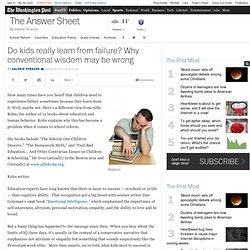
Well, maybe not. Here’s a different view from Alfie Kohn, the author of 12 books about education and human behavior. Kohn explains why this has become a problem when it comes to school reform. A Teacher's Guide To Performance Assessment. A Teacher’s Guide To Performance Assessment by Tom Vander Ark first appeared on gettingsmart.com A Teacher’s Guide To Performance Assessment by Tom Vander Ark In the narrowest sense, according to ETS, performance assessment is “A test in which the test taker actually demonstrates the skills the test is intended to measure by doing real-world tasks that require those skills, rather than by answering questions asking how to do them.”
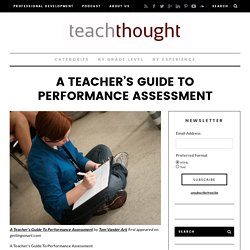
Many educators use five criteria from Wiggins and McTighe in Understanding by Design (UbD) when creating and evaluating performance assessments: Real-World Goal, Role, Audience, Standards for Success, and Product/Performance. A productive alternative to coverage and activity-oriented plans, over the last decade UbD has become a widely used strategy of backward design of units and projects. Similarly, Marc Chun, now at the Hewlett Foundation, wrote a paper on performance assessment in 2010 where he described the features of a quality performance task: 6 Common Misunderstandings About Assessment Of Learning. By Iain Lancaster, TeachThought Intern Over the past two decades there has been a lot written, and much discussion, around the use effective use of assessment in the classroom.
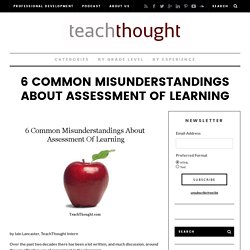
Unfortunately many educators, particularly at the secondary school level, continue to cling tenaciously to “traditional” practices which are, at best ineffective and at worst, counterproductive to the goals of modern education. Here are six common misconceptions about assessment and evaluation that we could stand to rethink.
Evaluer sans noter. L'évaluation des apprenants. Solutions et Procédures d'évaluations. The Finnish education system - InfoFinland. Finnish education is of high quality.
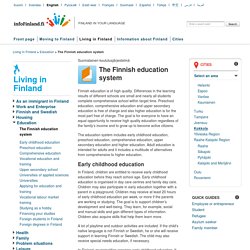
Differences in the learning results of different schools are small and nearly all students complete comprehensive school within target time. Preschool education, comprehensive education and upper secondary education is free of charge and also higher education is for the most part free of charge. The goal is for everyone to have an equal opportunity to receive high quality education regardless of the family’s income and to grow up to become active citizens. The education system includes early childhood education, preschool education, comprehensive education, upper secondary education and higher education.
978 951 39 7178 6 vaitos07102017. JYX - (Dis)empowering assessment? : assessment as experienced by students in their upper secondary school EFL studies. Educational Change and School Culture. Rev101ART4ing. Pta 12281 7170407 71036.pd. The most wanted: Teachers and teacher education in Finland. Efficiency of Finnish general upper secondary schools: an application of stochastic frontier analysis with panel data: Education Economics: Vol 20, No 4. 146428 finnish education in a nutshell. Learner autonomy in the foreign language classroom teacher learner curriculum and assssment. Diagnosing Foreign Language Proficiency: The Interface Between Learning and ... - J. Charles Alderson - Google Livres.
Validity in language assessment. Changes in Nordic Teaching Practices: From individualised teaching to the teaching of individuals: Scandinavian Journal of Educational Research: Vol 50, No 3. Multigrade teaching: towards an international research and policy agenda. Downloadfinland. Should ‘failing’ students repeat a grade? Retrospective response from Finland. Implications of the Modular Curriculum in the Senior Secondary School in Finland. Finnish National Agency for Education - Front page. Foreign Languages in Finland's Educational System - The New Federalist. PISA 2003 assessment focused primarily on students’ skills in mathematics, but their skills were also tested in science, reading literacy, and problem solving.
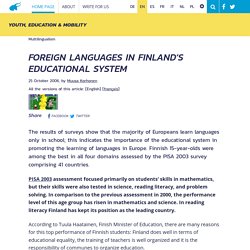
In comparison to the previous assessment in 2000, the performance level of this age group has risen in mathematics and science. In reading literacy Finland has kept its position as the leading country. According to Tuula Haatainen, Finish Minister of Education, there are many reasons for this top performance of Finnish students: Finland does well in terms of educational equality, the training of teachers is well organized and it is the responsibility of communes to organize education. Education in Finland. Why Are Finnish Kids So Smart? Update: TVOParents' Cheryl Jackson interviewed Dr.

Pasi Sahlberg, quoted extensively in the blog post below, about the Finnish education system in November 2011. In the lead-up to TVO's Learning 2030 event in Kitchener-Waterloo this weekend, producer Eric Bombicino looks at an educational superstar: Finland. Finland is seen by many as an educational superpower. Their students have placed at the top or near the top of the Organization for Economic Co-operation and Development's (OECD) Programme for International Student Assessment (PISA) over the past decade. The PISA tests a random sampling of 15-year-olds from 65 countries on reading, math, and science comprehension. Since the test was introduced in 2001, Finland has increasingly been held up as a model for educational reform. Standardized Testing Students do not have any mandatory exams until, as a high school senior, they are required to take an exam for entrance into university.
In a visit to Stanford University in early 2012, Dr. Why Finland Leads in Education. Pasi Sahlberg I am now relaxing after an intensive but successful NZEI Te Riu Roa annual meeting and conference and I feel very honoured to have been elected onto our National Executive for another term.
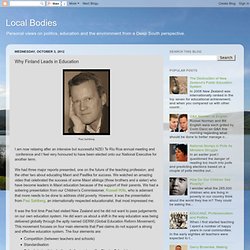
We had three major reports presented, one on the future of the teaching profession, and the other two about educating Maori and Pasifika for success. We watched an amazing video that celebrated the success of some Maori siblings (three brothers and a sister) who have become leaders in Maori education because of the support of their parents. We had a sobering presentation from our Children's Commissioner, Russell Wills, who is adamant that more needs to be done to address child poverty.
However, it was the presentation from Pasi Sahlberg, an internationally respected educationalist, that most impressed me. It was the first time Pasi had visited New Zealand and he did not want to pass judgements on our own education system. What is authentic assessment? New approaches to assessment » CORE Education. Drivers The NZQA website lists a number of examples of assessment approaches in which they distinguish between ‘task assessment’ and ‘evidence assessment’.
NZQA have also recognised that the increasing access to and use of digital technologies by students creates significant opportunities for assessing in different ways – using these technologies as the means of completing assessments that are no longer bound by the same constraints of time and place.